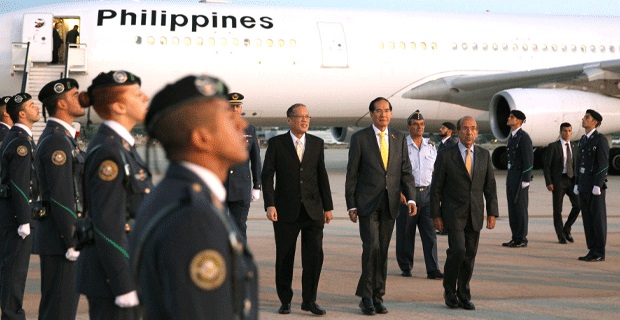
President Benigno Simeon Aquino III was welcomed by Philippine Ambassador to Spain Carlos Slinas and Juan Sunye Deputy Chief of Protocol of the ministry of foreign affairs and cooperation upon arrival at Torrejon Airbase in Madrid Spain. Photo By: Gil Nartea/ Malacanang Photo Bureau
MADRID—The Philippines is not only open for business—it’s more fun to do business there.
With these words, President Aquino began his European roadshow showcasing the country’s fast-rising economy before Spanish political leaders, investors, and members of the Filipino community here.
In speeches that sounded like a State of the Nation Address for a European audience, the President trumpeted the road networks, bridges and other infrastructure projects built under his watch, the country’s improved credit ratings, and better business climate, all to lure more potential investors.
“We are determined to prove to the world an important truth about our country: In the Philippines you will find a place where the government is focused on investing on its greatest resource, its people; a nation where entrepreneurs are viewed as partners, and where everyone works to prove that, for tourists and businesses alike: Es más divertido en las Filipinas [It’s more fun in the Philippines,” he told Spanish businessmen and members of his business delegation on Sunday, Sept. 14.
But by Mr. Aquino’s own admission, the rosy picture he painted of the Philippines came at a price—horrendous traffic.
“Even traffic has changed—it has worsened today,” he acknowledged in jest in a speech before a gathering of Filipinos at the Colegio Nuestra Señora de las Maravillas.
But the President said the monster gridlock should instead be seen as the “mark of a robust economy,” repeating the same argument that brought him under heavy criticism last year.
Among the Cabinet members in Mr. Aquino’s delegation is Transportation Secretary Joseph Emilio Abaya, who is under fire as well over worsening conditions at the Metro Rail Transit Line 3.
Transportation problems aside, the President spoke of a “transformation” that could be seen “everywhere you look” in the Philippines.
“To those of you who have not visited the Philippines in a long time, perhaps you would be surprised with the big changes,” he said, citing the “whole new different skyline” of Metro Manila, Cebu, and Davao among other fast-rising regions.
“Even I seem to be getting lost myself because of the big changes we are now experiencing in infrastructure.”
The President highlighted his campaign against corruption, the centerpiece of his administration’s reform agenda, saying it ensured that the corrupt would go to jail “even if you are rich or powerful.”
“Perhaps you have seen the pictures of those who are now in jail,” he told his Filipino audience in apparent reference to the three senators detained for allegedly pocketing millions in pork barrel.
In a separate event with Spanish businessmen later in the evening, the President said now was “an opportune time to invite you to invest in a resurgent economy.” He noted that the Philippine economy grew by an a average of 6.3 percent since he assumed office in 2010 until 2013, compared to the “primarily consumer-driven” 4.3-percent improvement three years before that.
In a bilateral meeting with Spanish Prime Minister Mariano Rajoy Monday, Mr. Aquino cited his host country’s own “positive economic news.” Europe’s economy has generally performed poorly but the President noted that Spain was showing “encouraging signs of recovery.”
“I hope that the economic gains in both our countries would translate into increased bilateral trade and investments,” he told Rajoy.
Mr. Aquino told Spanish businessmen that the Philippines was “working from strength to strength,” citing efforts to invest more in infrastructure, develop other industries like manufacturing, and provide more social services “so that more Filipinos can take part and contribute to this economic resurgence.”
“We are also cutting red tape, to make it easier for businesses to set up shop at home, and we are pushing for needed reform to liberalize industries that will invite greater enterprise, such as those in banking,” he said.
The President said the Philippines was just getting started.
“All of this, we have to stress, is only the beginning. Our focus has always been on inclusive growth, which necessarily means prioritizing our greatest resource, the Filipino people,” he said.
“To my ‘bosses,’ this is reform: the system is fixed, the economy improves and moves forward to build a society teeming with opportunities,” he said.

